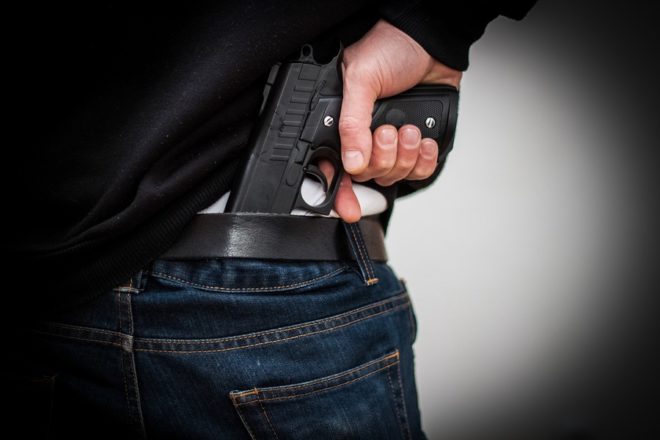

Call Attorney Marni Jo Snyder 24 Hours / 7 Days:
215.515.3360
The laws regarding firearm ownership vary from state to state, and they frequently change in response to pressure from the public or law enforcement efforts.
In Pennsylvania, there are even laws which vary from city to city – meaning Philadelphia gun laws are different from other cities throughout the state.
Those that own, carry, or anticipate carrying firearms should know the law to avoid any unwanted consequences.
1. Philadelphia citizens don’t need a license simply to “own” a gun
Even without a license, Philadelphia residents are permitted to have a gun in their home or place of business.
Licenses are necessary for those who want to carry a firearm on their person or in their vehicle, for example. In order to carry firearms in such places outside of the home or business, a “concealed carry” license is necessary.
In some states, citizens have been exercising their right to “open carry”– which means carrying a firearm that is not concealed and therefore, does not require a license.
So far, Pennsylvania does not have any laws that speak to open carry of firearms. Even though it is not illegal, however, does not mean it is advisable nor does it mean that there will not be open carry laws passed in the near future.
2. The definition of a “firearm” varies depending on the charge
Most people understand what a gun is, and may think that it is strange that it needs to be defined by statute.
But, the word “gun” is a generic term that can apply to a rifle, shotgun, pistol, etc.
In Philadelphia, for charges relating to possession and licensing violations, many types of rifles are not considered to be “firearms.”
On the other hand, some statutes have a broader definition of firearm. For example, there are some individuals who cannot possess firearms due to prior criminal charges or a current bench warrant or Protection from Abuse Order (PFA Order).
These charges are listed specifically by statute, and include felonies, violent crimes, and certain misdemeanors such as DUI and drug charges.
For those individuals, the definition of firearms includes “any weapon designed to expel a projectile by the action of an explosive or the frame or receiver of any such weapon.” 18 Pa. C.S.A. § 6105.
This definition includes rifles and gun accessories – meaning people who are banned from owning or possessing firearms can’t have rifles, spring guns, or even BB guns.
3. Not all gun charges are equal
Gun charges are serious convictions in Pennsylvania and most of them are felony charges.
However, the amount of punishment and the severity of the charge can increase due to certain factors – including prior convictions, whether the gun was loaded at the time of arrest, and, of course, the severity of the crime.
Pennsylvania judges use a complex chart known as a sentencing matrix to determine punishment for gun charges. The chart considers two factors: the offense gravity score (OGS) and the prior record score (PRS).
The OGS refers to how serious the underlying crime was. The higher the score, the more severe the crime.
For example, armed robbery would be higher on the OGS scale than possessing an unlicensed firearm.
The PRS score refers to any prior convictions by the defendant.
These include both gun and felony charges as well as some misdemeanors.
A first-time offender would have a PRS score of “0,” and the score would increase depending on how many prior convictions the person has and how severe they were.
Judges use the combination of the OGS and PRS scores of defendants to determine the length of the sentence.
This combination is why a first-time offender who commits a crime with an OGS score of “10”and a person with a prior felony who commits a crime with an OGS score of “3” may receive the same length of jail time when sentenced.
4. The Deadly Weapon Enhancement could increase sentencing for some crimes
Pennsylvania laws include a deadly weapon enhancement for some crimes.
This means that if the prosecution can determine that the defendant possessed a deadly weapon and that he intended to use it during the crime, then significant extra time can be added to the sentence (e.g., 18 months or more).
While firearms are obviously considered deadly weapons, the enhancement can also apply to things such as crowbars, tire irons, and BB guns.
5. There are defenses available to fight firearm charges
Gun laws in the state of Pennsylvania can be confusing, and those facing convictions have a lot at stake.
The first step for those facing gun charges is to contact an experienced attorney who is knowledgeable about the defenses available.
An attorney can review the case to determine whether officers had the right to conduct the search that resulted in finding the gun, whether the defendant actually possessed the gun, and many other factors.
Contact The Law Offices of M.J. Snyder, LLC Today
If you or a loved one is facing a gun charge, it is imperative to act quickly.
Contact M.J. Snyder, an attorney with solid experience fighting firearm charges in Philadelphia. For a free consultation, call 215-515-3360 today.
Call 24/7: 215.515.3360
Email: info@snyderlawyer.com
Fax: 215-376-6981
This website is for general informational purposes only. The act of sending an e-mail to the Firm or any attorney at the Firm, or submitting a form response or other materials through the website, will not create an attorney-client relationship. The only way to create an attorney-client relationship with the Firm is through a written agreement.Read More